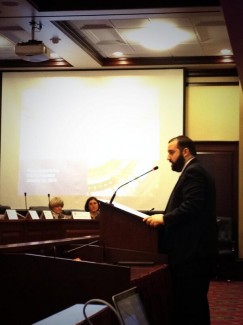We need help, we really do,” said Mechelle Thomas, an employee at the Idaho State Veterans Home in front of the joint Change in Employee Compensation committee Wednesday.

Chloe Rambo | Argonaut
Principle Evaluator of the Office of Performance Evaluations Bryon Welch presents a report to the joint Change in Employee Compensation committee Friday describing the disparities between legislative intent and implementation concerning employee salary.
“I take care of our veterans, young and old. I’ve noticed things around the building — we don’t have them like we used to, and I can’t afford a lot of things anymore,” Thomas said.
Audra Campbell, a co-worker of Thomas, said she chose to work at the home for the gratifying service to veterans, but she can’t continue to make ends meet.
“I’ve given my resignation because I can no longer afford to work at a job I love to work at,” Campbell said.
Tuesday marked the first meeting of the Joint Change in Employee Compensation Committee during a legislative session since 2008. Jeff Youtz, director of the legislative services office and former member of the CEC Committee, said the committee is an extremely important forum to ensure the state legislature is in touch with the needs of Idaho’s employees.
The state of Idaho has the largest percentage of minimum-wage employees in the state and these wages — the bread and butter of 1 million Idahoans –have come under fire from the public this week.
Donna Yule, executive director of the Idaho Public Employees Association, said it’s becoming increasingly difficult to hire and retain dedicated employees and the state’s too-low wages are to blame. She said the state workforce is top heavy and the pay disparity gap is growing.
“Our hope is that you would implement a plan,” Yule said of addressing the public’s needs.
On Friday, co-chair of the CEC committee Rep. Neil Anderson presented a draft to the committee that included the funding of approximately $99,000 from the state’s general fund to adjust the compensation schedule upwards by one percent. This will help move the salary structure towards market, or towards the salary amount considered appropriate.
The draft passed unanimously, 17-0, including the funding of approximately $5.5 million from the general fund for a permanent 1 percent salary increase for state employees and one-time funding of an additional 1 percent bonus for state employees.
Anderson said the CEC committee may choose whether or not to continue that bonus if the economy is doing well that year.
The continued meeting of the joint CEC committee during the 2015 legislative session was also included in the motion — intended to ensure future discussion of state employee compensation.
Youtz said he hopes the CEC committee continues to meet every year in the future, because understanding appropriate employee salary and health plan changes are a vital piece of the state’s yearly budget puzzle.
Wages are a dynamic part of the state’s economy, Youtz said. Idaho’s salaries dictate more than the employee’s ability to put food on their table — the state ideally wants to offer an attractive compensation and benefits package to draw individuals to the state’s workforce, retain employees in the state, as well as motivate and reward quality workers.
Bryon Welch, principal evaluator of the Office of Performance Evaluations, said there is a discrepancy between the legislative intent of compensation policies and their actual implementation.
According to survey performed by the OPE, 25 percent of responding state employees said they plan to leave their current job within the next two years. Poor compensation and lack of career advancement opportunities were cited as the primary reasons for increasing employee turnover.
“The responses we got from the state employees were overwhelmingly positive. They articulated very well their love and passion … for the work they perform. They are very satisfied in their jobs,” Welch said.
The highlights of the OPE report can be found here.
“This committee is a process to evaluate where we are in terms of compensation for state employees. The key to building those relationships — or any relationship — is listening,” said Rep. Neil Anderson, R-Blackfoot, CEC committee co-chair said. “So that’s what we’re going to focus on. We’re all trying to run this state of Idaho in the best fashion we can — none of us up here have all the answers. What we’re dealing with is a complex issue.”
During the three-day forum, the committee allowed state employees to give personal testimonies to influence pending compensation legislation.
Out of the ten public testimonies that took place during Wednesday’s forum, no individual said Idaho’s current wages were agreeable. Each testimony carried a common theme — the state’s current compensation plans are only tightening the belt on employees’ already-slim budgets and the populous is feeling the pressure.
Patrick Guzzle, a state employee, described two decisions he and his wife made that would continue to have a lasting effect on themselves and their family. First, Guzzle said, he and his wife moved to Idaho from Colorado and decided this was the place to raise their family. Second, they decided his wife would stay home to raise their family while Guzzle was considered the family’s main breadwinner.
He said the pressure to raise a family on the state’s current wages is becoming nothing but unbearable.
“I wish I could honestly stand in front of you and tell you my cost of living over the past five years has kept pace with my salary increases,” Guzzle said.
Chairman of the Idaho State Police Association Fred Rice said the force understands how the economic lean times can quickly trickle down to affect multiple state agencies, but he said the state’s current wages are simply meager — especially when compared to other state’s annual salaries.
“You’ve abandoned us — that’s what my people feel,” Rice said. “It’s time that we take care of the state employees that are out here.”
Chloe Rambo can be reached at [email protected]